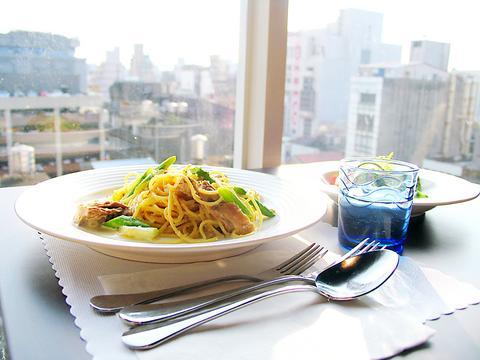Nestling near the top of the newly refurbished Eslite Wuchang Street Branch building in Ximending can be found the usual foodcourt suspects: a hotpot restaurant, a faux continental cuisine steak house, a Thai-style diner and the now ubiquitous Italian pasta joint.
Morita is no worse and no better than the rest. It has a range of set meals around the NT$300 mark and these are palatable, but you would not impress a date by going there. The surroundings are pleasant enough if you like pink lamps and wallpaper, which gives it a living room-type of ambiance. It has a great view of Ximending if rooftop apartments, water coolers, mired ceramic tile walls, streaked windows and corrugated iron roofs are your idea of an interesting panorama. The service was smart and friendly, without being anything to eulogize about.

PHOTO: JULES QUARTLY, TAIPEI TIMES
It could be said that spaghetti has in the last few years become the noodle of choice for many Taiwanese. Both noodles and pasta are made from wheat flour and salt is added, which is mixed with water to make a paste, dried and folded, then pulled and cut into long strips. Additions to the basic recipe include eggs for some noodles and pasta dishes, rice flour for rice noodles and vermicelli, fillings for gnocci and dumplings. Flavorings and colorings are as numerous as the spectrum of the rainbow.
Those who are familiar with the history of China will not be surprised to hear that it was the Chinese who originally invented pasta, possibly 5,000 years ago. Marco Polo, they say, introduced it to the Italians in the 13th century(along with ice cream and the pinata) who then conquered the culinary world with it.
It's recent popularity in Taiwan should come as no surprise then, where restaurateurs have quickly realized that a portion of pasta costs NT$10 a plate tops and the sauce isn't much more. Hence, repackage the noodles as pasta and increase the profit margins.
At these spaghetti restaurants you typically get a couple of microwaved buns that are sweet, white and cotton-like; followed by what is called a salad but is no more than a couple of leaves and shredded cabbage, set off by halved cherry tomatoes smothered in 1,000 island dressing. Often enough, it is all washed down with an iced tea. This is the pattern at Morita, with the addition of a dessert afterwards to give the impression of a more upmarket affair.
It may be cheap and cheerful but it's rarely enjoyable. I have sampled spaghetti in Italy and elsewhere around the world and the Taiwanese version does not come close, unfortunately. The pasta is rarely freshly made and often has that off the shelf and out-of-the-packet taste that coats the palate. The sauce, which as you would expect is the key, is invariably under par. It's tempting to stick with the noodles.

A vaccine to fight dementia? It turns out there may already be one — shots that prevent painful shingles also appear to protect aging brains. A new study found shingles vaccination cut older adults’ risk of developing dementia over the next seven years by 20 percent. The research, published Wednesday in the journal Nature, is part of growing understanding about how many factors influence brain health as we age — and what we can do about it. “It’s a very robust finding,” said lead researcher Pascal Geldsetzer of Stanford University. And “women seem to benefit more,” important as they’re at higher risk of

March 31 to April 6 On May 13, 1950, National Taiwan University Hospital otolaryngologist Su You-peng (蘇友鵬) was summoned to the director’s office. He thought someone had complained about him practicing the violin at night, but when he entered the room, he knew something was terribly wrong. He saw several burly men who appeared to be government secret agents, and three other resident doctors: internist Hsu Chiang (許強), dermatologist Hu Pao-chen (胡寶珍) and ophthalmologist Hu Hsin-lin (胡鑫麟). They were handcuffed, herded onto two jeeps and taken to the Secrecy Bureau (保密局) for questioning. Su was still in his doctor’s robes at

Last week the Democratic Progressive Party (DPP) said that the budget cuts voted for by the China-aligned parties in the legislature, are intended to force the DPP to hike electricity rates. The public would then blame it for the rate hike. It’s fairly clear that the first part of that is correct. Slashing the budget of state-run Taiwan Power Co (Taipower, 台電) is a move intended to cause discontent with the DPP when electricity rates go up. Taipower’s debt, NT$422.9 billion (US$12.78 billion), is one of the numerous permanent crises created by the nation’s construction-industrial state and the developmentalist mentality it

Experts say that the devastating earthquake in Myanmar on Friday was likely the strongest to hit the country in decades, with disaster modeling suggesting thousands could be dead. Automatic assessments from the US Geological Survey (USGS) said the shallow 7.7-magnitude quake northwest of the central Myanmar city of Sagaing triggered a red alert for shaking-related fatalities and economic losses. “High casualties and extensive damage are probable and the disaster is likely widespread,” it said, locating the epicentre near the central Myanmar city of Mandalay, home to more than a million people. Myanmar’s ruling junta said on Saturday morning that the number killed had